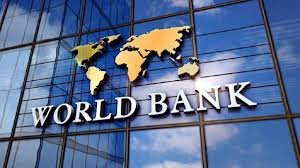
The World Bank has called on the Federal Government to reinforce its ongoing economic reforms with stronger fiscal discipline, transparent governance, and credible policy implementation to sustain Nigeria’s fragile economic recovery.
Releasing its October 2025 Nigeria Development Update (NDU) titled “From Policy to People: Bringing the Reform Gains Home,” the Bank commended the Tinubu administration’s bold reforms, such as the removal of fuel subsidies and unification of the foreign exchange market—but warned that without consistency and accountability, early progress could quickly unravel.
According to the report, Nigeria has made “substantial stabilisation progress” since 2023, but key risks remain, including inflationary pressures, limited fiscal space, and weak institutional capacity.
The World Bank urged the Central Bank of Nigeria (CBN) to sustain its tight monetary stance by maintaining positive real interest rates and avoiding the monetisation of fiscal deficits.
“Reliance on the Monetary Policy Rate to control naira liquidity should continue, complemented by open market operations and standing facilities,” the report noted. “Monthly statements of assets and liabilities should be published to assure the public that no fiscal deficits are being monetised.”
The Bank also advised the CBN to preserve flexibility in the foreign exchange market, describing it as a “shock absorber” vital to Nigeria’s resilience against global financial shocks.
“A transparent and consistent exchange rate policy, supported by a systematic framework for FX intervention, will build investor confidence and strengthen macroeconomic stability,” it said.
On fiscal management, the World Bank urged Nigeria to boost non-oil revenue by modernising tax administration, introducing digital invoicing, and improving compliance at both federal and state levels. It also recommended adopting modern property tax frameworks, increasing health-related levies, and gradually aligning Value Added Tax (VAT) rates with ECOWAS regional benchmarks.
In addition, the Bank called for a comprehensive forensic audit of the Nigerian National Petroleum Company Limited (NNPCL) and the clearing of pending federal audits between 2022 and 2024 to strengthen transparency.
It emphasised the need to sustain petroleum sector deregulation, settle outstanding electricity subsidy arrears, and move toward cost-reflective tariffs with targeted subsidies for vulnerable households.
To curb waste, the World Bank further advised the Federal Government to cut non-essential spending, such as on vehicles and training, adopt realistic budget assumptions, and reduce ad-hoc deductions at the Federation Account Allocation Committee (FAAC) to protect subnational fiscal stability.



